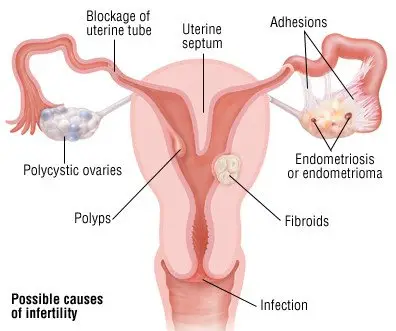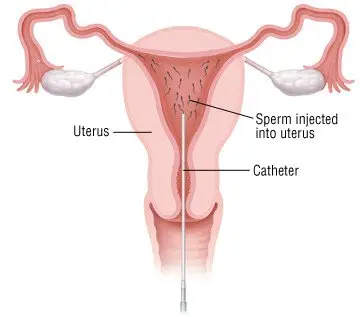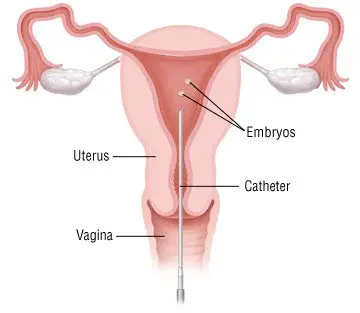What is Female Infertility?

Most couples who have unprotected sex at least twice per week are able to become pregnant within one year. If pregnancy does not occur after one year, the man and woman are diagnosed as having an infertility problem.
Infertility can result from problems in the man, the woman or both partners. In some couples, no cause of infertility can be found. In other couples, more than one cause exists.
Normal aging reduces a woman's ability to become pregnant. As a woman grows older, ovulation—the process of forming and releasing an egg—becomes slower and less effective.
Aging begins to reduce fertility as early as age 30. Pregnancy rates are very low after age 44. This is true even when fertility medications are used.
Symptoms
The primary symptom of infertility is difficulty getting pregnant. Various causes of infertility may result in additional symptoms.
Any of the following problems may cause infertility:
- Infrequent ovulation. When your periods do not come every month, you have infrequent ovulation.
Common causes of infrequent ovulation include:
- Body stresses such as:
- Eating disorders
- Unusually ambitious exercise training
- Rapid weight loss
- Low body weight
- Obesity
- Some hormonal abnormalities such as:
- Thyroid problems
- Pituitary-gland problems
- Adrenal-gland problems
- Polycystic ovary syndrome
Hormonal abnormalities can delay or prevent the ovaries from releasing an egg. Symptoms that suggest a hormone abnormality include:
- Unexpected weight loss or gain
- Fatigue
- Excessive hair growth or hair loss
- Acne
- Ovarian cysts. Cysts in the ovary can cause pelvic pain. They also can interfere with the normal process of ovulation.
- Scarring in the fallopian tubes. This can prevent pregnancy by stopping the egg from traveling into the uterus.
Damage can result from:
- A previous surgery
- A previous ectopic (tubal) pregnancy
- Endometriosis
- Pelvic inflammatory disease (PID). PID is a bacterial infection in the pelvis. It often scars, damages or blocks the fallopian tubes.
- Abnormalities in the shape or lining of the uterus, such as fibroid tumors or uterine polyps. These conditions also can cause:
- Heavy menstrual bleeding
- Pelvic pain
- Enlargement of the uterus
Scar tissue can develop within the uterus as a complication of:
- Uterine infections
- Miscarriages
- Abortions
- Surgical procedures such as a dilation and curettage (D&C)
Such scar tissue can lead to infrequent periods or minimal menstrual flow.
|
|
Diagnosis
The first step in diagnosing female infertility is determining whether ovulation is occurring at predictable intervals. When an egg is released, it causes a shift in the body's sex hormones.
This shift in sex hormones can be detected with these tests:
- Early-morning core body temperature. You use a precise (basal body) thermometer to take your temperature first thing every morning. You will detect a slightly higher temperature after ovulation.
- Ovulation predictor test. This is an over-the-counter urine test. It can predict egg release. A positive test means you have ovulated recently or are about to ovulate.
- Vaginal mucus. You may be able to recognize changes in the appearance and consistency of your vaginal mucus. These changes signal hormone shifts that show ovulation has occurred.
Your doctor will examine your vagina and pelvic organs. A sample of mucus from your cervix and vagina may be tested for possible infection.
If necessary, blood tests may be used to:
- Confirm normal ovulation
- Show whether the ovaries are functioning well enough to release eggs
- Measure the function of your thyroid, pituitary and adrenal glands
Other tests may also help to determine the cause of infertility. These examine the physical structure of pelvic organs.
- Hysterosalpingogram. This is an X-ray study in which a liquid dye is injected into your uterus. It reveals problems such as polyps and fibroid tumors in the uterus. It can also reveal partial or complete blockage of the fallopian tubes.
- Ultrasound. An ultrasound reveals the shape and size of the uterus. It gives some information about the uterine cavity or inner lining. An ultrasound can identify the shape and size of the ovaries and the presence of developing cysts.
- Hysteroscopyand laparoscopy. These are surgical procedures performed by a gynecologist. Both procedures use a small video camera to view the pelvic organs.
During a hysteroscopy, your doctor can see the inside of your uterus. He or she can obtain biopsies. In some cases, the doctor can remove polyps, fibroids or scar tissue.
Laparoscopy allows your doctor to view the outside of your uterus and inspect your ovaries. Sometimes, it is possible to remove ovarian cysts or scar tissue during a laparoscopy.
Expected Duration
A fertility evaluation usually extends over several months. The evaluation requires numerous tests. Some tests must be done during a specific time in the menstrual cycle.
The treatments also require time, careful planning and repeated office visits.
With continued frequent sexual intercourse, infertile couples have a small chance of getting pregnant even without treatment.
Prevention
You can optimize your chances of getting pregnant in a number of ways.
- Exercise moderately. Do not exercise so heavily that your menstrual periods are infrequent or absent.
- Maintain a healthy weight. A good goal is a body mass index (BMI) of at least 20 and below 27.
- Avoid smoking.
- Limit caffeine. High intake of caffeinated drinks may impair fertility.
- Review your medicines with your doctor. Some medications can affect your ability to conceive or carry a normal pregnancy.
- Consider following a "fertility diet." Women who do the following may have better rates of fertility:
- Eating more beans, nuts and other fertility-boosting plant protein
- Eating more whole grains
- Avoiding sugary sodas
- Having a glass of whole milk and other full-fat dairy food every day (even including an occasional small bowl of ice cream)
Some treatments for cancer can cause infertility. Certain techniques allow a woman planning to undergo chemotherapy or radiation to later have a baby from her own egg. Discuss these with your doctor before beginning cancer treatment.
Treatment
Treatment depends on the results of your infertility evaluation. Some causes of infertility have a specific treatment. For example, surgery may be done to remove a fibroid tumor.
Treatment options
The following list of medications are in some way related to or used in the treatment of this condition.
- Clomid
- Femara
- metformin
- Ovidrel
- Menopur
View more treatment options
Fertility Drugs
Infertility may be associated with infrequent or absent ovulation. This often can be treated with hormone medications. These are called fertility drugs.
All fertility medications have potential side effects. And they can cause multiple babies in one pregnancy. Most fertility treatments require the supervision of a fertility specialist.
Examples of fertility medicines include:
- Clomiphene (Clomid, others). This medicine stimulates the ovary to release one or more eggs. It works by adjusting levels of your natural hormones. It works only if your infertility is caused by failure of the ovary to release eggs.
- Luteinizing hormone (LH) and follicle-stimulating hormone (FSH). These injected hormone medications encourage the ovaries to release more than one egg at a time. Like clomiphene, it works only if your infertility is caused by failure of the ovary to release eggs.
These medicines are sometimes given after treatment with another hormone medicine, a GnRH analogue. A GnRH analogue prepares the body for a precisely timed cycle of ovulation.
Surgical Procedures
After treatment with fertility drugs, eggs can be allowed to travel naturally from the ovary into the uterus, if the fallopian tubes are healthy. Sometimes surgery is used to harvest the mature eggs after fertility drug treatment.
Examples of procedures that can help to start a pregnancy include:
- Intrauterine insemination (IUI) is a procedure in which sperm are directly inserted into the uterus using a special catheter or a syringe.
|
|
- In vitro fertilization (IVF). The eggs that the ovary has been stimulated to release are collected surgically. The eggs and sperm are combined in the laboratory, to produce embryos. One or more embryos are then inserted into your uterus.
IVF does not guarantee pregnancy. On the other hand, sometimes more than one embryo implants itself in the uterus. This can result in twins, or higher-order multiple pregnancies.
IVF requires treatment with hormones beforehand.
|
|
- Zygote intrafallopian transfer (ZIFT) and gamete intrafallopian transfer (GIFT) are variations of IVF. They require at least one healthy fallopian tube.
In ZIFT, eggs are surgically removed from the ovary. They are combined with sperm in a laboratory, to produce tiny early embryos. The embryos are placed in the fallopian tube. They are allowed to travel to the uterus on their own.
In GIFT, eggs and sperm are placed in the fallopian tube before the sperm has fertilized the egg. This allows the eggs and sperm to fertilize inside the woman.
As with IVF, these procedures require hormone pretreatment.
It is important to get counseling about all options for parenthood. This includes procedures for adoption.
When To Call a Professional
Speak with a physician after one year of unsuccessfully trying to conceive. At this point, you may want to begin an infertility evaluation.
If you are over 35, consider consulting your physician after four to six months of trying to conceive. Pregnancy is less likely to occur without fertility treatment at this age.
If you are undergoing any fertility treatment, notify your infertility specialist about pelvic pain and abdominal swelling.
Prognosis
The chance of a successful pregnancy depends on the cause of infertility. More than half of couples who seek infertility treatments eventually become pregnant.
Additional Information
American Society for Reproductive Medicine
https://www.reproductivefacts.org
RESOLVE: The National Infertility Association







